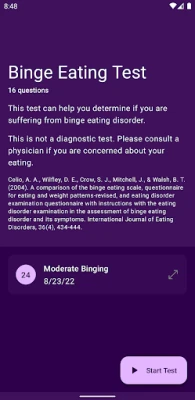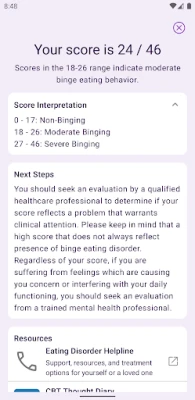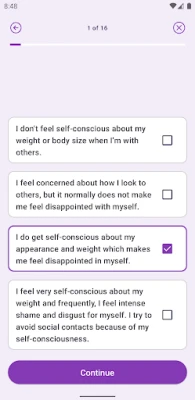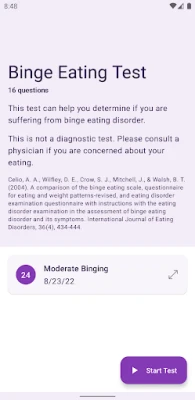
Latest Version
Version
1.1
1.1
Update
September 11, 2024
September 11, 2024
Developer
Inquiry Health LLC
Inquiry Health LLC
Categories
Medical
Medical
Platforms
Android
Android
Downloads
0
0
License
Free
Free
Package Name
com.bingeeating.test
com.bingeeating.test
Report
Report a Problem
Report a Problem
More About Binge Eating Disorder Test
Binge Eating Disorder is a eating disorder characterized by binge eating episodes but without unhealthy purging behavior such as vomiting. It is the most common eating disorder in adults and
Not everyone who binges on food has Binge Eating Disorder. Binge Eating Disorder requires negative physical, psychological, or social effects such as:
Marked distress regarding binge eating
Subjective loss of control over how much or what is eaten
Feelings of shame, guilt, and disgust following a food binge
Eating alone or secretly due to embarrassment
Binge Eating Disorder can have a wide variety of mental and physical consequences, such as obesity and depression. However, it can be effectively treated through psychotherapy, medication, surgery, and lifestyle interventions.
Disclaimer: This test is NOT a diagnostic test. A diagnosis can only be provided by a qualified healthcare professional. Please consult a physician or mental health professional if you are concerned about your mental health.
Celio, A. A., Wilfley, D. E., Crow, S. J., Mitchell, J., & Walsh, B. T. (2004). A comparison of the binge eating scale, questionnaire for eating and weight patterns‐revised, and eating disorder examination questionnaire with instructions with the eating disorder examination in the assessment of binge eating disorder and its symptoms. International Journal of Eating Disorders, 36(4), 434-444.
Marked distress regarding binge eating
Subjective loss of control over how much or what is eaten
Feelings of shame, guilt, and disgust following a food binge
Eating alone or secretly due to embarrassment
Binge Eating Disorder can have a wide variety of mental and physical consequences, such as obesity and depression. However, it can be effectively treated through psychotherapy, medication, surgery, and lifestyle interventions.
Disclaimer: This test is NOT a diagnostic test. A diagnosis can only be provided by a qualified healthcare professional. Please consult a physician or mental health professional if you are concerned about your mental health.
Celio, A. A., Wilfley, D. E., Crow, S. J., Mitchell, J., & Walsh, B. T. (2004). A comparison of the binge eating scale, questionnaire for eating and weight patterns‐revised, and eating disorder examination questionnaire with instructions with the eating disorder examination in the assessment of binge eating disorder and its symptoms. International Journal of Eating Disorders, 36(4), 434-444.
Rate the App
Add Comment & Review
User Reviews
Based on 0 reviews
No reviews added yet.
Comments will not be approved to be posted if they are SPAM, abusive, off-topic, use profanity, contain a personal attack, or promote hate of any kind.
More »










Popular Apps

Moon Chai StoryOlha Dobel

phpFoxPHPFOX LLC

Govee LiteGovee

World War Heroes — WW2 PvP FPSAzur Interactive Games Limited

Build World AdventureExplore city in cube world

Viking Clan: RagnarokKano Games

Vikings: War of ClansPlarium LLC

Asphalt 9: LegendsGameloft SE

Submarine Car Diving SimulatorSwim with dolphins & penguins

Union VPN - Secure VPN ProxyPureBrowser
More »










Editor's Choice

Grim Soul: Dark Survival RPGBrickworks Games Ltd

Craft of Survival - Gladiators101XP LIMITED

Last Shelter: SurvivalLong Tech Network Limited

Dawn of Zombies: Survival GameRoyal Ark

Merge Survival : WastelandStickyHands Inc.

AoD Vikings: Valhalla GameRoboBot Studio

Viking Clan: RagnarokKano Games

Vikings: War of ClansPlarium LLC

Asphalt 9: LegendsGameloft SE

Modern Tanks: War Tank GamesXDEVS LTD



















